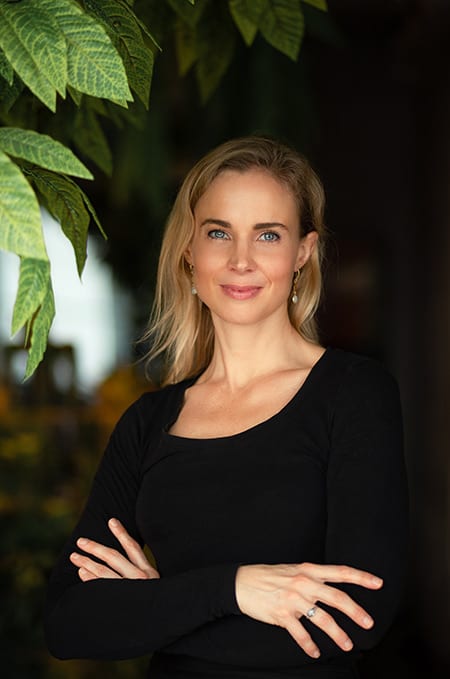By Gwyneth K. Shaw

Over almost a decade as a children’s advocate in eastern Africa and southeast Asia, Emma Day ’20 saw how easily youth in developing countries can be exploited—often by foreigners and especially online. That led her to co-found a nonprofit to help victims seek compensation from their abusers.
But Day still wanted to do more—to make a direct connection between legal advocacy and technology policy. That’s what drew her to Berkeley Law’s LL.M. degree program, which prepares foreign lawyers for global practice.
“It’s partly the proximity to the people building these platforms. But there are also people here working on the cutting edge of both law and technology, and experts on privacy law and human rights,” Day says. “I’m learning huge amounts every day.”
Her work for UNICEF in Southeast Asia focused on the sexual abuse of children online. She became increasingly aware that the pace of the technology children were using outstripped the ability of parents and law enforcement to protect their privacy and safety.
“What became apparent to me is kids in the region, and around the world, are using American apps: Facebook, Instagram, WhatsApp, Snapchat,” she says. “But the governments where they live don’t have jurisdiction over them.”
That makes investigating abuse cases involving these applications difficult, if not impossible. In 2015, Day co-founded Child Redress International, which matches victims with a network of pro bono lawyers. As a Fulbright Scholar at Berkeley Law, she is advancing the cause even more.
The LL.M. advantage
Day is on the LL.M. program’s thesis track, which adds a faculty-supervised research project to the traditional on-site, nine-month program. Berkeley Law also offers a professional track (two consecutive summers on campus), and a hybrid option (two semesters online plus one summer in Berkeley).
Evelyn Yang Borchert, academic advisor and J.S.D. program director in the school’s Advanced Degree Programs office, says she’s delighted to have Day on the LL.M. thesis track.
“Emma is doing some incredibly interesting and important work, and LL.M. students like her enrich the Berkeley Law community by sharing their unique experiences and perspectives,” Borchert says.
Day relishes the ability to dig in with Berkeley Law’s expert faculty, including Professor Paul Schwartz, who is advising her thesis project; privacy expert Chris Hoofnagle; clinical professor Jennifer Urban ’00; and Human Rights Center Executive Director Alexa Koenig ’13.
Day also enjoys the different perspectives of her classmates, who hail from a wide variety of countries.
“I meet so many amazing people daily,” she says. “It’s opened my eyes to a lot of things related to children’s rights. Also, the method of teaching here is very engaging. It’s a really different approach.”
Raising awareness
She’s taken a particular interest in children’s toys that use artificial intelligence to engage with the user. These toys collect data, and Day learned in Hoofnagle and Urban’s cybersecurity course that once they go off the market, companies stop crafting patches for security breaches—leaving them vulnerable to hacking.
Day made a vlog, the first in what she hopes will be a series, about some of these toys and the issues they raise. She sees the videos as a way to make her thesis work more accessible.
“These things are developing way more quickly than the safety precautions can be put in place. I’m concerned that many of them are being sold as STEM educational toys so people will think they’re really helping their child,” Day says. “But these toys collect data—building a database for facial recognition and listening to what the children are saying.”
The Berkeley Law LL.M. will add to the United Kingdom native’s already glittering resume, which includes an LL.M. in human rights law from the University of London. She also co-founded the first hot yoga studio in Kenya, and while she no longer owns it, yoga practice remains a core part of her life.
“I’ve been working on a variety of human rights issues the last 20 years or so, and it can be challenging to keep focusing on human suffering,” she says. “It helps to have a practice that grounds you—it’s definitely essential to my mental health.”
Day hopes that by understanding how American technology companies work and are governed, she can help child victims through greater transparency and accountability.
“What’s difficult is that child rights and tech are kind of their own sectors,” she says. “I’m thinking about new and creative ways to bridge the two in order to address these issues more effectively.”
Applications to the Berkeley Law LL.M. degree program open Aug. 1. The application deadline is Dec. 18 for the thesis, traditional, and professional tracks, and Nov. 15 for the hybrid option. Click here to learn more and apply.